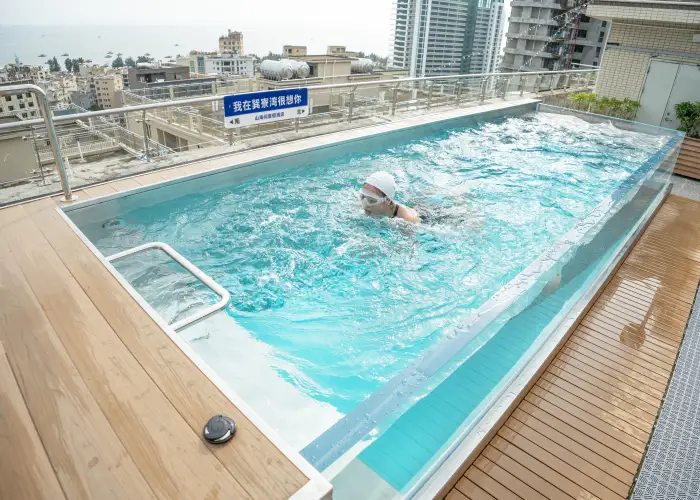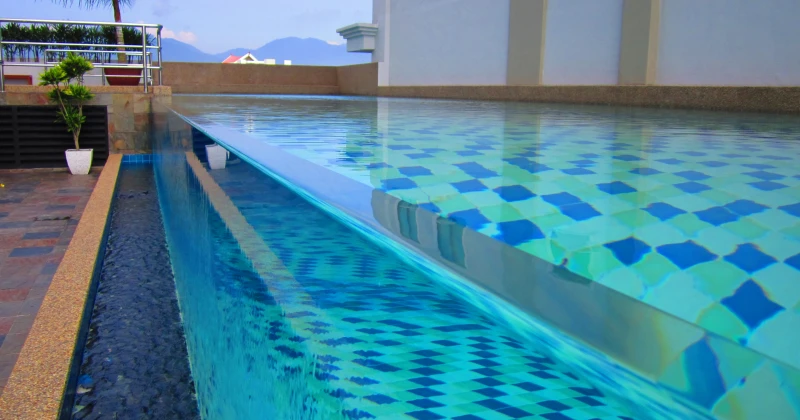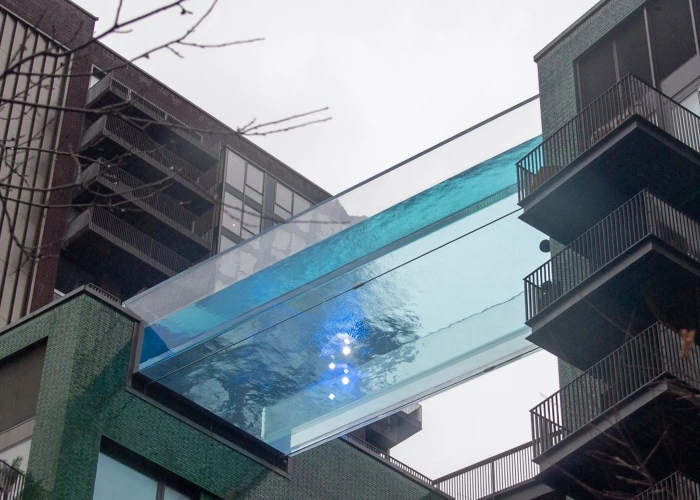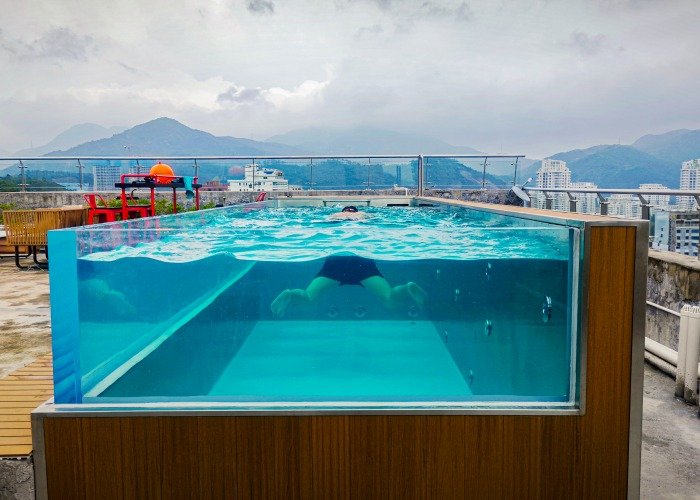
Can an Exercise Pool Replace a gym? Pros and Cons Explained
Are you thinking about swapping your gym membership for an exercise pool at home? You're not alone! More and more people are discovering the unique benefits of water workouts.
Instead of waiting for machines at a crowded gym, you step into your exercise pool for a full-body workout that's gentle on your joints. Pretty appealing, right? Water workouts provide a range of options from beginner-friendly movements to special movements that target specific muscles.
But let's be real - is it a complete replacement for the gym? It depends on your fitness goals and what you love about working out. Water resistance provides tremendous workout benefits, but some elements of aquatic exercise are different from strength training at the gym, and you should be aware of them.
If you want to learn more about comparing pool workouts with other workouts you get in the gym, then you need to read on. If you are thinking of the change, we can discuss individual advantages and disadvantages that will assist you in making a decision.
What Is an Exercise Pool and How Does It Work?
An exercise pool is constructed uniquely for water exercises. An exercise pool is different from a recreational pool, one that is used for swimming or designed solely for swimming, diving, and recreational activities. The water also offers a form of support to the body joints making this exercise ideal for the injured or anybody who wishes to avoid putting pressure on the joints.
Exercising in a pool offers a body-friendly way of working out the muscles. Whether you are water walking or doing more specific pool therapy exercises for the back, the water aids the movements and adds resistance, which makes the exercise much more beneficial.

The Benefits of Using an Exercise Pool
1. Low-Impact Workout
One of the primary benefits of an exercise pool is its ability to provide a low-impact workout. The water supports your body weight, reducing strain on joints, bones, and muscles. This makes it an excellent choice for people who suffer from arthritis, or joint pain, or those recovering from surgery.
- Pool exercises for the lower back and other spinal-related exercises are easier on the body in water, helping to relieve pain without causing further stress.
- Individuals dealing with chronic conditions like sciatica will find relief in performing pool exercises, which allow for safe stretching and strengthening.
2. Full-Body Workout
Water naturally offers resistance, meaning every movement you make is more challenging than on land. This resistance helps target multiple muscle groups simultaneously.
- Pool exercises for legs, such as underwater squats or walking, work on the lower body, building strength and toning muscles.
- The upper body is also engaged through movements like water arm circles and chest presses, providing a balanced workout.
- Swimming pool exercises for back pain can improve posture and strengthen the core, back, and spinal muscles.
3. Cardiovascular Health
An exercise pool can also serve as an excellent option for cardiovascular training. The water provides a unique resistance that helps elevate the heart rate without putting too much strain on the body.
- Water walking, swimming, and even water running can provide the same cardiovascular benefits as land-based exercises like jogging or cycling.
- With a combination of pool exercises for beginners and more advanced routines, you can improve stamina, endurance, and overall heart health.
4. Increased Flexibility and Range of Motion
Working out in the water allows for more fluid, controlled movements that enhance flexibility and mobility.
- The buoyancy of water supports your body, allowing you to stretch and move with greater ease, making it ideal for individuals with a limited range of motion or stiffness.
- For example, pool therapy exercises for the back can help increase spinal flexibility and reduce tightness, which is particularly helpful for those with lower back pain.
- Swimming pool exercises for back pain are also great for gently stretching the spine and improving its overall mobility.
5. Stress Relief and Relaxation
Water has a calming and soothing effect on the body, making it a perfect medium for reducing stress. Performing exercises in water can promote relaxation, enhance mood, and reduce anxiety.
- For example, pool exercises for the lower back can not only relieve physical discomfort but also help calm the nervous system, reducing stress levels.
- The cooling effect of water combined with gentle movements makes the exercise pool a fantastic tool for achieving both physical and mental wellness.

Drawbacks of Replacing the Gym with an Exercise Pool
Despite the various advantages of an exercise pool, some disadvantages should be discussed when considering replacing a gym with water exercises.
1. Limited Equipment and Variety
Conventional gym centers provide numerous exercise facilities, including weight-developing and cardiovascular exercise machines. An exercise pool offers fewer workout choices than an exercise club.
- Swimming may be ideal for beginners, but for those who want to lift weights or do some muscular training, a gym is more appropriate.
- The lack of specific gym equipment also narrows down the possibility for muscle-specific exercises, such as leg presses or bench presses, which are usually designed to work specific muscles in the body.
2. Accessibility and Availability
Some regions provide private pools, which are very costly. Also, you may not get into a public pool, or the pools may not facilitate your fitness routine.
- In an inaccessible or crowded pool, you may be unable to find time to do the workout.
- The size of the pool can also be a limitation. Some swimming pool exercises for back pain require larger spaces to perform certain stretches or movements that may not be possible in smaller pools.
3. Safety Considerations
While exercising in water can be gentler on the body, there are safety concerns to be aware of, especially for beginners or those unfamiliar with water workouts.
- Those who rarely embark on water training may encounter severe problems of slipping or even falling into the water if the activities are intense.
- It's crucial to maintain proper form during exercises like pool therapy exercises for the back to avoid straining the muscles or causing injury.
4. Less Social Interaction
Some of you may prefer socializing, that’s why engaging in group classes or with other people at the gym seems like more fun. At an exercise pool, you won’t necessarily have the same interaction with people, especially if you get a personal exercise pool or a less crowded option.
- Lack of group classes or fitness communities means you will be exercising in the water alone, and this may kill your motivation if you are a social person.

Can an Exercise Pool Replace a gym?
It is entirely up to your personal preferences and the availability of certain facilities in your region. For anyone who has an injury or joint problem or is interested in a low-impact workout, an exercise pool is a great option.
When an Exercise Pool Works as a Replacement:
- Cardiovascular Health: Aquatic exercises, including swimming or water jogging, benefit their cardio effects without leaving you with the pounding of actual workouts on land.
- Full-Body Strength: The water resistance works out all the muscles and provides full, non-weight-bearing strength training.
- Pain Management: For individuals with chronic pain or injuries, pool therapy exercises for the back and pool exercises for sciatica can help alleviate discomfort while strengthening muscles.
- Flexibility and Mobility: Being buoyant in water is easier than doing stretches and movements on land; it raises you above your weight and promotes flexibility.
When a Gym May Be More Suitable:
- Heavy Lifting and Strength Training: At a conventional gym, various machines and weights may be more effective if you're focused on building muscle mass or isolating specific muscle groups.
- Specialized Equipment: If you are taking a spin class, lifting weights, or using gym machines such as leg presses or treadmills, a gym suits you.
- Variety and Motivation: If you like the structure of the class or you’re looking for something that has a community feel, the social aspect of the gym might be what you’re after.

Conclusion
So, what's the bottom line? An exercise pool is a game changer for people who’re interested in gentle yet effective workouts that don’t stress your joints. If you want to step into fitness, work your way through back pain, or simply prefer to work out in water, it's the right thing. Plus, there's something special about having your own private workout space right at home.
But here's the thing - if you're dreaming of building serious muscle or need specific gym equipment, you might miss aspects of a traditional gym. It comes down to what you want from your workouts. Love the idea of low-impact cardio and therapeutic exercise? An exercise pool might be all you need. Big on weightlifting? You might want to keep that gym membership.
And there is no one-size-fits-all answer. Ask yourself what matters most to you: your fitness goals, what kind of exercise you actually like, what will fit your lifestyle and space. The bottom line is that if you enjoy your workout, you’ll stick with it—whatever it is that you choose.



























